Refine search
Actions for selected content:
47 results
On the process and value of direct close replications: A rejoinder to Shafir and Cheek’s (2024) commentary on Chandrashekar et al. (2021)
-
- Journal:
- Judgment and Decision Making / Volume 20 / 2025
- Published online by Cambridge University Press:
- 28 August 2025, e34
-
- Article
-
- You have access
- Open access
- HTML
- Export citation
5 - Color Commentary
-
- Book:
- Gift and Grit
- Published online:
- 26 May 2025
- Print publication:
- 12 June 2025, pp 152-181
-
- Chapter
- Export citation
Interaction between mental disorders and social disconnectedness on mortality: a population-based cohort study: commentary, Kukreja et al
-
- Journal:
- The British Journal of Psychiatry / Volume 226 / Issue 4 / April 2025
- Published online by Cambridge University Press:
- 29 April 2025, pp. 247-248
- Print publication:
- April 2025
-
- Article
- Export citation
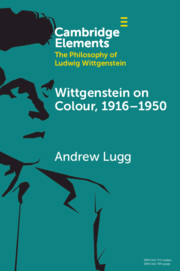
Wittgenstein on Colour, 1916–1950
-
- Published online:
- 26 February 2025
- Print publication:
- 06 March 2025
-
- Element
- Export citation
Aristotle for all? The work of Walter Mooney Hatch
-
- Journal:
- Journal of Classics Teaching , First View
- Published online by Cambridge University Press:
- 24 January 2025, pp. 1-5
-
- Article
-
- You have access
- Open access
- HTML
- Export citation
Why comment? Interlingual commentaries in early modern India
-
- Journal:
- Journal of the Royal Asiatic Society / Volume 35 / Issue 1 / January 2025
- Published online by Cambridge University Press:
- 16 December 2024, pp. 197-221
- Print publication:
- January 2025
-
- Article
-
- You have access
- Open access
- HTML
- Export citation
Exceptional racism at the dawn of scientific psychiatry in Brazil: the curious case of Juliano Moreira: commentary
-
- Journal:
- The British Journal of Psychiatry / Volume 225 / Issue 5 / November 2024
- Published online by Cambridge University Press:
- 11 December 2024, p. 510
- Print publication:
- November 2024
-
- Article
- Export citation
Chapter 21 - Future Directions
- from Part II - Multidisciplinary Perspectives on Youth Climate Distress
-
-
- Book:
- Climate Change and Youth Mental Health
- Published online:
- 06 June 2024
- Print publication:
- 13 June 2024, pp 403-419
-
- Chapter
- Export citation
Chapter 2 - Ancient Readers of the Gorgias
-
-
- Book:
- Plato's Gorgias
- Published online:
- 25 May 2024
- Print publication:
- 30 May 2024, pp 27-47
-
- Chapter
- Export citation
Chapter 13 - Concepts in Greek Mathematics
-
-
- Book:
- Conceptualising Concepts in Greek Philosophy
- Published online:
- 25 April 2024
- Print publication:
- 02 May 2024, pp 307-329
-
- Chapter
-
- You have access
- Open access
- HTML
- Export citation
Hyper-exegesis in Persian translations of the Qu'ran: On the Disjointed Letters as Translational Challenges
-
- Journal:
- International Journal of Middle East Studies / Volume 56 / Issue 1 / February 2024
- Published online by Cambridge University Press:
- 01 April 2024, pp. 38-54
- Print publication:
- February 2024
-
- Article
-
- You have access
- Open access
- HTML
- Export citation
Chapter 3 - Occasions
-
- Book:
- Persianate Verse and the Poetics of Eastern Internationalism
- Published online:
- 14 December 2023
- Print publication:
- 21 December 2023, pp 105-130
-
- Chapter
- Export citation
Questioning the Appropriateness of Examining Guanxi in a Wasta Environment: Why Context Should Be Front and Center in Informal Network Research – A Commentary on ‘De-Linking From Western Epistemologies: Using Guanxi-Type Relationships to Attract and Retain Hotel Guests in the Middle East’
-
- Journal:
- Management and Organization Review / Volume 19 / Issue 5 / October 2023
- Published online by Cambridge University Press:
- 09 November 2023, pp. 1040-1045
-
- Article
-
- You have access
- Open access
- HTML
- Export citation
Chapter 8 - The Cave
- from Part III - Myth and Allegory in the Republic
-
- Book:
- How Plato Writes
- Published online:
- 27 July 2023
- Print publication:
- 17 August 2023, pp 163-180
-
- Chapter
- Export citation
5 - The Papyri
-
- Book:
- Latin Military Papyri of Dura-Europos (<i>P.Dura</i> 55–145)
- Published online:
- 21 July 2023
- Print publication:
- 10 August 2023, pp 193-658
-
- Chapter
- Export citation
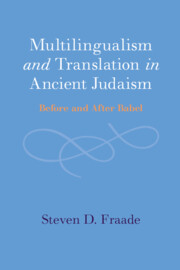
Multilingualism and Translation in Ancient Judaism
- Before and After Babel
-
- Published online:
- 01 August 2023
- Print publication:
- 21 September 2023
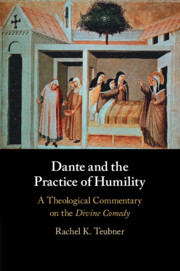
Dante and the Practice of Humility
- A Theological Commentary on the Divine Comedy
-
- Published online:
- 29 June 2023
- Print publication:
- 13 July 2023
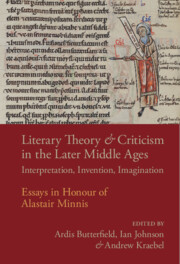
Literary Theory and Criticism in the Later Middle Ages
- Interpretation, Invention, Imagination
-
- Published online:
- 20 April 2023
- Print publication:
- 20 April 2023
Introduction
-
-
- Book:
- Literary Theory and Criticism in the Later Middle Ages
- Published online:
- 20 April 2023
- Print publication:
- 20 April 2023, pp 1-23
-
- Chapter
- Export citation
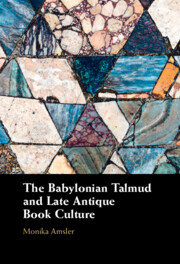
The Babylonian Talmud and Late Antique Book Culture
-
- Published online:
- 30 March 2023
- Print publication:
- 06 April 2023
-
- Book
-
- You have access
- Open access
- Export citation
